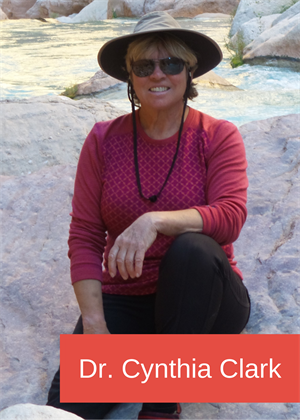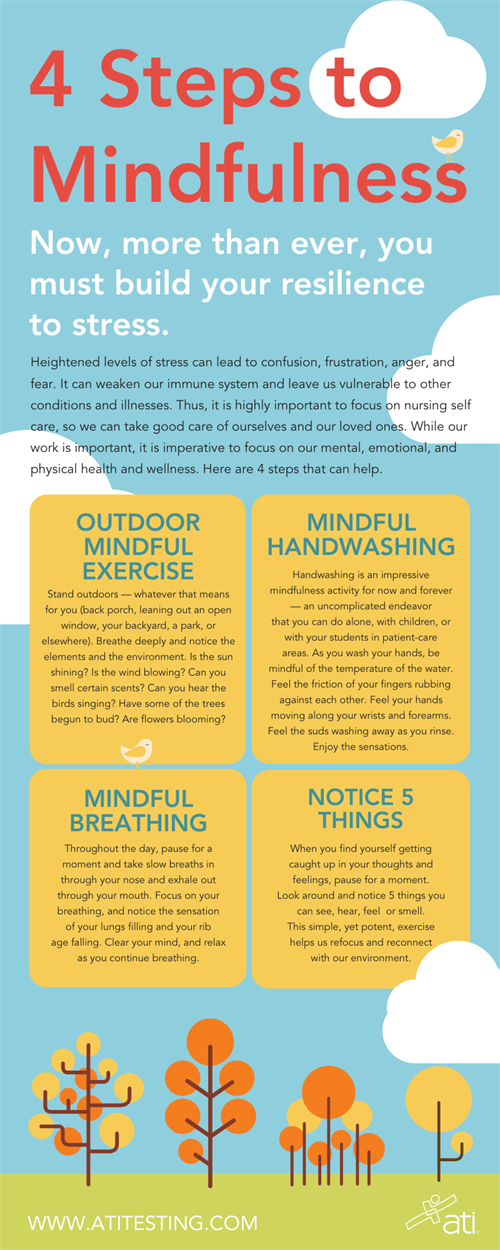Nursing self care during COVID-19 starts with mindfulness
Igniting the Power of Self Care, Wellness, Resilience, and Mindfulness in Nursing
 By Dr. Cynthia Clark
By Dr. Cynthia Clark
“Life is a dance. Mindfulness is witnessing that dance.” – Amit Ray
When the World Health Organization proclaimed 2020 as the Year of the Nurse and Midwife, one could scarcely imagine that the year 2020 would mark a most extraordinary time in history and shine an incredible spotlight on nurses around the globe. In addition to celebrating the Year of the Nurse and Midwife and International Nurses Day on May 12, which coincides with the 200th birthday of Florence Nightingale, we pause to honor and celebrate nurses in the United States during National Nurses Week from May 6-12 and our nursing students on National Student Nurses Day on May 8.
The immediate and colossal pivot that all nurses — including academic leaders, educators, and students — made and continue to make in response to the COVID-19 pandemic is nothing short of amazing. Academic workplaces and learning environments have been deeply affected by the virus. In-person clinical experiences have been discontinued, and courses have moved online. In the immediate onset of the pandemic, students were disallowed from entering the clinical environment for many reasons, including the critical shortage of PPEs, lack of nurse supervision, and the need to limit the number of people allowed in the patient care areas.
At the same time, nursing students, newly licensed nurses, and retired nurses returning to the workforce were critically needed — and the response from academic institutions, healthcare facilities, professional nursing organizations, regulatory agencies, federal and state governments, and nursing industry has been an incredible experience to behold. We’ve seen amazing efforts by our nursing leaders to swiftly and efficiently release policy briefs and position statements calling for practice and academic partnerships, for clinical facilities to reopen doors to nursing students, for nursing students to support healthcare facilities in the role of student nurse for compensation and/or receiving academic credit toward meeting clinical requirements, and an urgent call for a massive investment in nursing education and leadership development around the globe.
THE STRESSES CHALLENGING NURSING SELF CARE TODAY
Despite these positive changes, the impact of the pandemic on our daily lives has been swift and disruptive. Stress levels are significantly heightened during this unprecedented and unpredictable time in history.
- We wonder how long the pandemic will last and fret about its lasting impact.
- Physical and social distancing, quarantine, sheltering in place, locking down — all words are now part of our daily lexicon.
- Many faculty and students are homeschooling and parenting children while working and learning from home.
- There are concerns about finances now and in the future.
- There is a real and potential threat of illness to self, loved ones, neighbors, and friends.
- Faculty are teaching online using virtual and remote methodologies — and implementing new and unfamiliar technologies that are often confusing.
- Some faculty have been laid off, furloughed, or asked to take voluntary leave. Will they come back to teaching? Will those close to retirement stay?
- How will we manage the proposed budget cuts to our colleges and universities?
- Students worry about transitioning to online learning and how doing so will impact their coursework and clinical experiences.
- Pinning ceremonies and commencement activities are now virtual.
The changes are stressful, the pandemic is deadly, and each of us is impacted in our own personal way. Nursing self care has seemed the least of our concerns.
NURSING SELF CARE BEGINS WITH YOU
Heightened levels of stress can lead to confusion, frustration, anger, and fear. For some, sleep has been disrupted; others may feel demotivated to eat well, exercise, and engage in self-care activities. Increased and prolonged levels of stress can cause or exacerbate mental health symptoms and conditions. Stress can weaken our immune system and leave us vulnerable to other conditions and illnesses.
Therefore, it is highly important to focus on nursing self care so we can take good care of ourselves and our loved ones. It’s important to stay current and up-to-date by accessing reputable sources for relevant and timely information about sheltering-in-place and following safety guidelines and safe practices. While our work is important, it is imperative to focus on our mental, emotional, and physical health and wellness.
DOWNLOAD THE INFOGRAPHIC AS A HANDY REFERENCE
 4 NURSING SELF CARE STEPS YOU CAN TAKE TODAY
4 NURSING SELF CARE STEPS YOU CAN TAKE TODAY
Building resilience should be an integral part of our personal nursing self-care plan. Resilience is the ability to overcome the various challenges in life and adapt well in the face of adversity, trauma, and stress. It’s the ability to bounce back from life’s most challenging situations.
One power-packed way to build resilience is to practice mindfulness activities. Mindfulness is the state of paying attention and being fully present and alert to our surroundings and environment. It means focusing attention in a purposeful way on the present moment, becoming aware of what is happening in the here-and-now, and being cognizant of our internal and external world without judgment.
Let’s walk through a few mindfulness exercises that you can do just about anywhere, at any time — and within 1 minute or less.
1. OUTDOOR MINDFUL EXERCISE
Stand outdoors — whatever that means for you (back porch, leaning out an open window, your backyard, a park, or elsewhere). Breathe deeply and notice the elements and the environment. Is the sun shining? Is the wind blowing? Can you smell certain scents? Can you hear the birds singing? Have some of the trees begun to bud? Are flowers blooming?
This quick and simple, yet powerful, exercise takes only 30-60 seconds to perform. You can do it almost any time. And it provides a formidable way of turning your brain to a mindful and contemplative mode.
2. NOTICE 5 THINGS
When you find yourself getting caught up in your thoughts and feelings, pause for a moment. Look around and notice 5 things you can see, hear, feel or smell. For example, I see my husband’s banjo and think about the joy it brings when he plays, and I sing along. I can see the breeze blowing through the trees in our backyard and hear the birds chirping near the birdbath.
This simple, yet potent, exercise helps us refocus and reconnect with our environment.
3. MINDFUL BREATHING
Throughout the day, pause for a moment and take slow breaths in through your nose and exhale out through your mouth. Focus on your breathing, and notice the sensations of your lungs filling and your rib cage falling. Clear your mind, and relax as you continue breathing.
4. MINDFUL HANDWASHING
Handwashing is an impressive mindfulness activity for now and forever — an uncomplicated endeavor that you can do alone, with children, or with our students in patient-care areas. As you wash your hands, be mindful of the temperature of the water. Feel the friction of your fingers rubbing against each other. Feel your hands moving along your wrists and forearms. Feel the suds washing away as you rinse. Enjoy the sensations.
Times of uncertainty and crisis can be significant sources of stress. Hence, it’s important for each of us to seek calm and restoration through mindfulness and other resilience-building activities.
The emotional impact of COVID-19 is undeniable. So, integrating personal and nursing self-care and wellness activities into our daily lives is essential to our overall health and well-being. During National Nurses Month, let’s recommit to taking better care of ourselves as we care for others.
